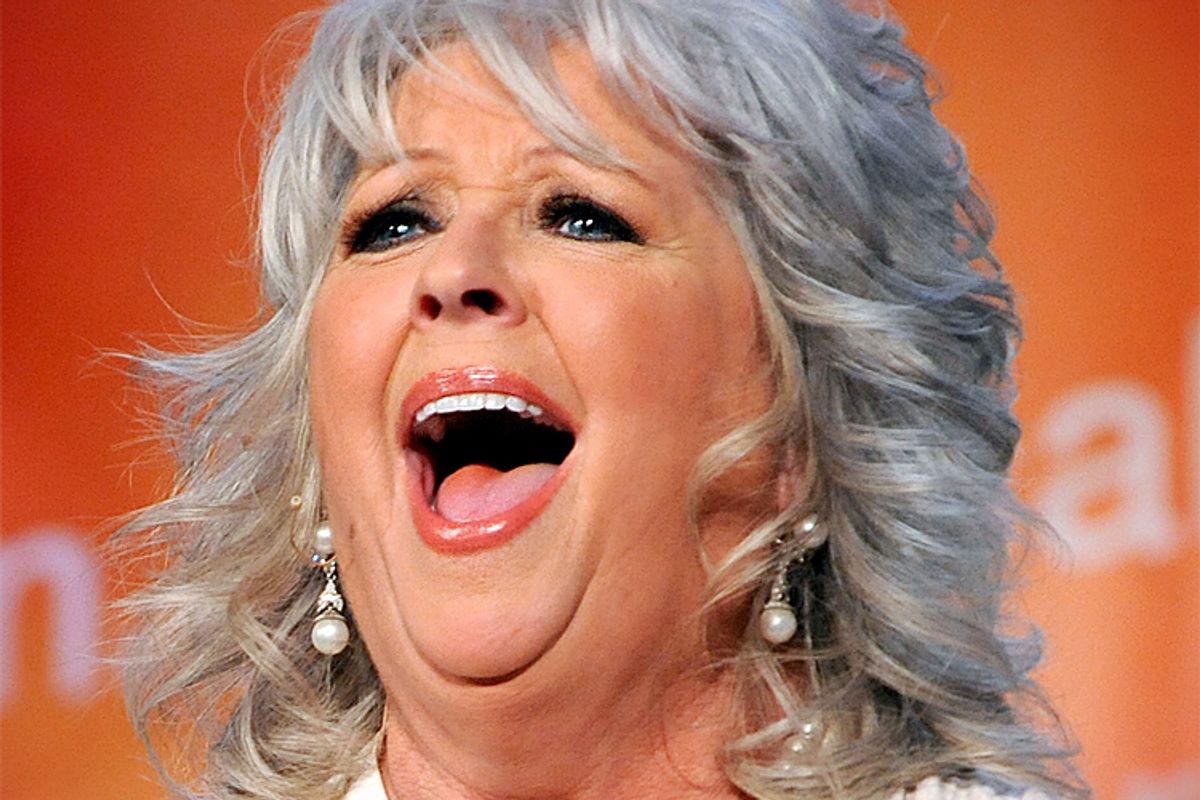I love Southern cooking. My parents are from the South -- Tennessee and Alabama -- and I grew up with fried chicken, black-eyed peas, corn bread, collards and peach cobbler. So it’s not difficult to understand why I would become a Paula Deen fan. I liked her the first time I saw her -- topping a gooey dessert with ice cream and whipped cream.
It was more than her food. It was her voice, with that easy Southern twang, her megawatt smile, her self-deprecating sense of humor, and her feistiness. She embodied the best of the White South. Her home base may have been Savannah, Georgia, a city with a history of discrimination, but I never saw any indication of the racism so stereotypical of Southerners. She often had black guests on her show, and she was on Oprah more times than I can remember. I cursed Anthony Bourdain when he attacked her fat-laden recipes -- calling her “the worst, most dangerous person to America” (a little extreme, no?). So last week, when I read that she admitted to using “the N-word,” I was more than a little disturbed.
After all, I’m an educated African-American woman. How could I have spent all those years supporting, defending and cheering for a racist? And of course she is a racist. She used That Word, which only racists do. And some rappers. And comedians. And writers. And lots of other people -- blacks and, for that matter, people of all colors. But when a white person uses that word in anger? Well, that must be her real feelings slipping out. And what’s the deal with the Old Plantation wedding? Really, Paula? Really?
Still, I can’t bring myself to dislike her. Of course I’m disappointed that the N-word passed her lips. However, I understand why and how it happened, and I forgive her. Deen is a product of the place and time in which she was raised. There are many Southerners who are proud of their Confederate roots, whose ancestors owned slaves, as Deen’s did. But without honest dialogue between all races, some, perhaps like Deen, won’t ever understand why such reminders of our racist past are still so painful, even in 2013. Particularly in 2013.
We are not living in a post-racial society, despite the Supreme Court’s decision this week to overturn the key provision in the Voting Rights Act because “the nation is no longer divided along those lines.” Just because a biracial man who appears more black than white was elected president doesn’t make discrimination based on color a problem of the past. If race were no longer an issue in this country then young black men wouldn’t make up the vast majority of those incarcerated. And minorities wouldn’t have lower test scores because of unfairly funded schools, and poverty would not affect minorities disproportionately. And no one would contest the president’s heritage.
The fact of the matter is, race still matters. It is a constant fact of life in this country whether we want to admit it or not. It would be nice to feel like Obama’s election and resounding reelection signaled the end to racism in America, but I fear that it just made those who have hatred in their hearts that much more determined to keep minorities “in their place.” The fear of losing control of the country to minorities has actually pushed many out of the racist closet. The country is as divided by race as it has ever been. The difference now is that people don’t speak in public what they are thinking and sharing behind closed doors. The difference is that now there are laws that protect minorities from overt discrimination, legislation like the Voting Rights Act, which has protected every citizens’ access to voting since 1965.
Certainly there is less discrimination today than in 1965, but to say that this is a post-racial era is to invite scorn from anyone who has ever been pulled over for “driving while black” or been followed by a security guard while shopping, or failed to get a job because her name was LaKisha or Shaniqua. And I could go on, but I won’t, because it makes me angry to think about how so many died to get the right to vote without restrictions, and to see the highest court in the land eradicate those protections because it refuses to be honest about the real state of race in America.
Which brings me back to Paula. Why is everyone acting so surprised that a white Southern lady of a certain age has used the N-word? Of course she has. I wouldn’t believe her if she said she hadn’t. I’d be surprised if there are many Southerners Deen’s age who have never used it. I disagree with the knee-jerk reaction of the Food Network and other companies to dump her – who did you think you were getting when you signed her on? She is still a sassy, funny, Southern cook who likes fattening comfort food. But now, she’s also a real person. Discrimination and prejudice will never get better if we sweep it under the rug and pretend it’s not there.
I’d love to sit down with Paula Deen and have a long talk about the legacy of slavery and the power of the N-word, because I think she’d listen. That’s more than I can say about Justices Roberts, Scalia, Kennedy, Alito and Thomas.

Shares